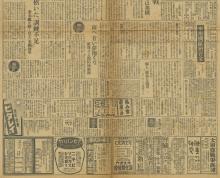Chapter 8 : Ida, Su Yin, the light of Tin Hau, and the wrath of Yen Lo
Primary tabs
Repulse Bay gets its first mention. As does the Repulse Bay Hotel.
HK Observatory is observed from the Mount Austin apartments with a signal 1 typhoon warning hoisted. He then describes the events of Typhoon Ida on 27 August 1954.
His mother met with Governer Grantham at Government House.
They visit friends on Stonecutters Island:"near their house, there was a large anti-aircraft gun left over from the war".
He describes a longer route to HMS Tamar via Happy Valley and Wanchai (I wonder if this is the same route that the number 15 bus takes i.e via Stubbs Road?).
Shek O is visited and is described as "To one side, a tiny fishing village stood on a promontory".
Sai Ying Pun is mentioned within the context of the view from the peak. He also says that "the bellow of a cow in the Kennedy Town abattoir might lift up to me - to be abruptly cut short" Note that before 1961, the abattoir was actually the Smithfield Cattle Depot, located between Pokfield Path and Rockhill St.
Somewhere around the peak is a boulder that contains the inscription: "25th Battn. Middlesex Regt. "Tyndareus" Feb. 6th 1917". It is commemorating the soldiers killed on a HK-bound troopship sunk off the coast of South Africa by a German mine.


Comments
Places in Chapter 8
Here are the places from this chapter that have been created so far. For more information about a place, either click its name in the list, or click its red marker on the map. Your are welcome to add another place - just remember to give it the tags golden boy, chapter 8 so that it shows up on the list and map below.
The map below is 'live': you can drag it around with your mouse, click the +/- buttons to zoom in and out, and click the Map/ Satellite/ Hybrid buttons to change the appearance of the map.
Tyndareus Stone
Update to dead links: The stone that formerly stood near the junction of Harlech and Hatton Roads on the Peak can be viewed here and its current location here
It reads: 'This stone memorial was erected by Lieutenant Colonel John Ward, Commanding Officer, in memory of those men of the 25th Battalion, The Middlesex Regiment who died when the troopship TYNDAREUS struck a German mine off Cape Agulhas, South Africa on 6th February 1917.
The Battalion had embarked in England and were en route for Hong Kong to carry out garrison duties.
There is no doubt the exemplary conduct of all ranks after the accident contributed in considerable measure to the Master's ability to prevent his ship from sinking with further loss of life.'
Intrestingly enough, no lives were lost. The story of the Stone is told by Dan Waters here